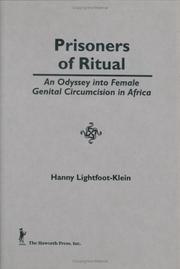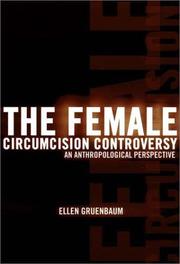| Listing 1 - 10 of 21 | << page >> |
Sort by
|

ISBN: 0866568778 Year: 1989 Volume: 2 Publisher: New York : Haworth Press,
Abstract | Keywords | Export | Availability | Bookmark
 Loading...
Loading...Choose an application
- Reference Manager
- EndNote
- RefWorks (Direct export to RefWorks)
Clitoridectomy --- Female circumcision --- Infibulation --- Clitoridectomie --- Excision (Ethnologie) --- Clitoridectomy. --- Infibulation. --- Female circumcision. --- Female genital mutilation
Book
ISBN: 1580468756 1580468594 158046498X 1322198772 Year: 2014 Publisher: Rochester, NY : University of Rochester Press,
Abstract | Keywords | Export | Availability | Bookmark
 Loading...
Loading...Choose an application
- Reference Manager
- EndNote
- RefWorks (Direct export to RefWorks)
In the nineteenth through the mid-twentieth centuries, American physicians treated women and girls for masturbation by removing the clitoris (clitoridectomy) or clitoral hood (female circumcision). During this same time, and continuing to today, physicians also performed female circumcision to enable women to reach orgasm. While the opposite purposes of these clitoral surgeries (to either contain a perceived excessive sexuality or to remedy a perceived lack of sexual responsiveness) may seem paradoxical, their use reflects a consistent medical conception of the clitoris as a sexual organ. In recent years both the popular media and academics have commented on the rising popularity in the United States of female genital cosmetic surgeries, including female circumcision, yet these discussions often assume such surgeries are new. In Female Circumcision and Clitoridectomy in the United States: A History of a Medical Treatment, Sarah Rodriguez presents an engaging and surprising history of surgeries on the clitoris, revealing what the therapeutic use of clitoridectomy and female circumcision tells us about changing (and not so changing) medical ideas concerning the female body and female sexuality. Sarah B. Rodriguez teaches at Northwestern University in the Medical Humanities and Bioethics Program and in the Global Health Studies Program.
Clitoris --- Female circumcision --- Surgery --- Circumcision, Female --- Clitoridotomy --- Female genital cutting --- Female genital modification --- Female genital mutilation --- FGC (Female genital cutting) --- FGM (Female genital mutilation) --- Genital cutting, Female --- Genital mutilation, Female --- Mutilation, Female genital --- Body marking --- Initiation rites --- Vulva
Book
ISBN: 3863882644 3863887077 Year: 2015 Publisher: Leverkusen Budrich UniPress
Abstract | Keywords | Export | Availability | Bookmark
 Loading...
Loading...Choose an application
- Reference Manager
- EndNote
- RefWorks (Direct export to RefWorks)
Weibliche Genitalbeschneidung ist ein Phänomen, das aus verschiedenen Perspektiven betrachtet unterschiedliche Reaktionen hervorruft. Wie erleben betroffene Frauen mit somalischer Herkunft die Praktik im Kontext von Migration? Und welchen Blick haben Fachkräfte der Sozialen Arbeit und migrierte somalische Männer auf weibliche Genitalbeschneidung? Insgesamt wird deutlich, dass die Perspektive betroffener Frauen und Männer in der Sozialen Arbeit in Zukunft deutlich mehr berücksichtigt werden muss. Female circumcision is a phenomenon that causes different reactions from different perspectives. How do Somali women experience the practice in the context of migration? And what view do social workers and migrated Somali men have of female circumcision? Overall, it is clarified that the perspective of affected women and men in social work will have to be given much more future consideration. So unterschiedlich die Persönlichkeiten und Biographien der GesprächspartnerInnen, so vielfältig sind deren Aussagen. Dennoch wird klar: Nachwievor sind Hebammen und GynäkologInnen zu wenig über weibliche Genitalbeschneidung informiert und verhalten sich Betroffenen gegenüber all zu oft unangemessen, ja herablassend. Aber eine maßgebende Voraussetzung für die Akzeptanz von Aufklärungsbemühungen ist ein offener, wertschätzender Kontakt auf Augenhöhe. frauenrechte.de, 01/2016
Gender studies: women --- Female circumcision --- Circumcision, Female --- Clitoridotomy --- Female genital cutting --- Female genital modification --- Female genital mutilation --- FGC (Female genital cutting) --- FGM (Female genital mutilation) --- Genital cutting, Female --- Genital mutilation, Female --- Mutilation, Female genital --- Body marking --- Clitoris --- Initiation rites --- Surgery --- circumcision --- Female Genital Mutilation --- Migration --- Normativity --- Normativität --- Somalia --- Weibliche Genitalverstümmelung --- Weibliche Genitalverstümmelung --- Normativität
Book
ISBN: 1282622870 9786612622878 0299234932 9780299234935 0299234940 9780299234942 9780299234942 9781282622876 6612622873 Year: 2010 Publisher: Madison, Wis. : University of Wisconsin Press,
Abstract | Keywords | Export | Availability | Bookmark
 Loading...
Loading...Choose an application
- Reference Manager
- EndNote
- RefWorks (Direct export to RefWorks)
Female genital excision, or the ritual of cutting the external genitals of girls and women, is undoubtedly one of the most heavily and widely debated cultural traditions of our time. By looking at how writers of African descent have presented the practice in their literary work, Elisabeth Bekers shows how the debate on female genital excision evolved over the last four decades of the twentieth century, in response to changing attitudes about ethnicity, nationalism, colonialism, feminism, and human rights. Rising Anthills (the title refers to a Dogon myth) analyzes works in English, French, and Arabic by African and African American writers, both women and men, from different parts of the African continent and the diaspora. Attending closely to the nuances of language and the complexities of the issue, Bekers explores lesser-known writers side by side with such recognizable names as Ngugi wa Thiong'o, Flora Nwapa, Nawal El Saadawi, Ahmadou Kourouma, Calixthe Beyala, Alice Walker, and Gloria Naylor. Following their literary discussions of female genital excision, she discerns a gradual evolution--from the 1960s, when writers mindful of its communal significance carefully "wrote around" the physical operation, through the 1970s and 1980s, when they began to speak out against the practice and their societies' gender politics, to the late 1990s, when they situated their denunciations of female genital excision in a much broader, international context of women's oppression and the struggle for women's rights.

ISBN: 0252027418 Year: 2002 Publisher: Urbana (Ill.) : University of Illinois press,
Abstract | Keywords | Export | Availability | Bookmark
 Loading...
Loading...Choose an application
- Reference Manager
- EndNote
- RefWorks (Direct export to RefWorks)
Clitoridectomy. --- Female circumcision. --- Feminist theory --- Infibulation. --- Clitoridectomy --- Female circumcision --- Infibulation --- Labiorrhapy --- Feminism --- Feminist philosophy --- Feminist sociology --- Theory of feminism --- Circumcision, Female --- Clitoridotomy --- Female genital cutting --- Female genital modification --- Female genital mutilation --- FGC (Female genital cutting) --- FGM (Female genital mutilation) --- Genital cutting, Female --- Genital mutilation, Female --- Mutilation, Female genital --- Clitorectomy --- Clitoris --- Philosophy --- Excision --- Vulva --- Body marking --- Initiation rites --- Vulvectomy --- Surgery
Book
ISBN: 9280639412 Year: 2005 Publisher: [Place of publication not identified] United Nations Children's Fund
Abstract | Keywords | Export | Availability | Bookmark
 Loading...
Loading...Choose an application
- Reference Manager
- EndNote
- RefWorks (Direct export to RefWorks)
Physiology: reproduction & development. Ages of life --- UNICEF --- Female circumcision --- Clitoridectomy --- Anthropology --- Social Sciences --- Social & Cultural Anthropology --- Statistics --- Clitorectomy --- Clitoris --- Vulvectomy --- Circumcision, Female --- Clitoridotomy --- Female genital cutting --- Female genital modification --- Female genital mutilation --- FGC (Female genital cutting) --- FGM (Female genital mutilation) --- Genital cutting, Female --- Genital mutilation, Female --- Mutilation, Female genital --- Body marking --- Initiation rites --- Excision --- Surgery

ISBN: 0812235738 0812217462 1336206063 0812292510 Year: 2001 Publisher: Philadelphia, Pennsylvania : University of Pennsylvania Press,
Abstract | Keywords | Export | Availability | Bookmark
 Loading...
Loading...Choose an application
- Reference Manager
- EndNote
- RefWorks (Direct export to RefWorks)
To the Western eye, there is something jarringly incongruous, even shocking, about the image of a six-year-old girl being held down by loving relatives so that her genitals can be cut. Yet two million girls experience this each year. Most Westerners, upon learning of the practice of female circumcision, have responded with outrage; those committed to improving the status of women have gone beyond outrage to action by creating various programs for "eradicating" the practice. But few understand the real life complexities families face in deciding whether to follow the traditional practices or to take the risk of change. In The Female Circumcision Controversy, Ellen Gruenbaum points out that Western outrage and Western efforts to stop genital mutilation often provoke a strong backlash from people in the countries where the practice is common. She looks at the validity of Western arguments against the practice. In doing so, she explores both outsider and insider perspectives on female circumcision, concentrating particularly on the complex attitudes of the individuals and groups who practice it and on indigenous efforts to end it. Gruenbaum finds that the criticisms of outsiders are frequently simplistic and fail to appreciate the diversity of cultural contexts, the complex meanings, and the conflicting responses to change. Drawing on over five years of fieldwork in Sudan, where the most severe forms of genital surgery are common, Gruenbaum shows that the practices of female circumcision are deeply embedded in Sudanese cultural traditions-in religious, moral, and aesthetic values, and in ideas about class, ethnicity, and gender. Her research illuminates both the resistance to and the acceptance of change. She shows that change is occurring as the result of economic and social developments, the influences of Islamic activists, the work of Sudanese health educators, and the efforts of educated African women. That does not mean that there is no role for outsiders, Gruenbaum asserts, and she offers suggestions for those who wish to help facilitate change. By presenting specific cultural contexts and human experiences with a deep knowledge of the tremendous variation of the practice and meaning of female circumcision, Gruenbaum provides an insightful analysis of the process of changing this complex, highly debated practice.
Female circumcision. --- Excision (Ethnologie) --- #SBIB:39A9 --- #SBIB:39A11 --- #SBIB:316.346H29 --- Medische antropologie / gezondheid / handicaps --- Antropologie : socio-politieke structuren en relaties --- Positie van de vrouw in de samenleving: andere topics --- Sociology of culture --- Physiology: reproduction & development. Ages of life --- Sexology --- Sociology of the family. Sociology of sexuality --- Development aid. Development cooperation --- Female circumcision --- Circumcision, Female --- Clitoridotomy --- Female genital cutting --- Female genital modification --- Female genital mutilation --- FGC (Female genital cutting) --- FGM (Female genital mutilation) --- Genital cutting, Female --- Genital mutilation, Female --- Mutilation, Female genital --- Body marking --- Clitoris --- Initiation rites --- Surgery --- Female genital mutilation. --- Anthropology. --- Folklore. --- Gender Studies. --- Linguistics. --- Women's Studies. --- Race --- Marriage --- Development policy --- Patriarchy --- Rituals --- Sexuality --- Book
Book
ISBN: 274750445X Year: 2001 Publisher: Paris L'Harmattan
Abstract | Keywords | Export | Availability | Bookmark
 Loading...
Loading...Choose an application
- Reference Manager
- EndNote
- RefWorks (Direct export to RefWorks)
Circumcision --- Female circumcision --- Circoncision --- Excision (Ethnologie) --- 392.1 --- Seksualiteit --- Rechten van de mens --- Spiritualiteit/Godsdiensten --- Circumcision, Female --- Clitoridotomy --- Female genital cutting --- Female genital modification --- Female genital mutilation --- FGC (Female genital cutting) --- FGM (Female genital mutilation) --- Genital cutting, Female --- Genital mutilation, Female --- Mutilation, Female genital --- Body marking --- Clitoris --- Initiation rites --- Amputation, Foreskin --- Foreskin amputation --- Foreskin removal --- Male circumcision --- Prepucectomy --- Removal of foreskin --- Foreskin --- Doop. Besnijdenis. Initiatie. Meerjarigverklaring --- Sexualité --- Droits de l'Homme --- Spiritualité/Religions --- Surgery --- Circumcision. --- Female circumcision. --- 392.1 Doop. Besnijdenis. Initiatie. Meerjarigverklaring
Book
ISBN: 0151731527 Year: 1992 Publisher: San Diego, CA ; London : Harcourt Brace Jovanovich,
Abstract | Keywords | Export | Availability | Bookmark
 Loading...
Loading...Choose an application
- Reference Manager
- EndNote
- RefWorks (Direct export to RefWorks)
Abused women --- African American women --- Female circumcision --- Women immigrants --- Immigrant women --- Immigrants --- Circumcision, Female --- Clitoridotomy --- Female genital cutting --- Female genital modification --- Female genital mutilation --- FGC (Female genital cutting) --- FGM (Female genital mutilation) --- Genital cutting, Female --- Genital mutilation, Female --- Mutilation, Female genital --- Body marking --- Clitoris --- Initiation rites --- Afro-American women --- Women, African American --- Women, Negro --- Women --- Battered women --- Victims of crimes --- Battered woman syndrome --- Surgery --- Africa. --- Eastern Hemisphere --- Africa
Book
ISBN: 0520965574 9780520965577 9780520291980 0520291980 9780520291997 0520291999 Year: 2017 Publisher: Oakland, California
Abstract | Keywords | Export | Availability | Bookmark
 Loading...
Loading...Choose an application
- Reference Manager
- EndNote
- RefWorks (Direct export to RefWorks)
"The last three decades have witnessed a proliferation of NGOs engaging in new campaigns to end the practice of female genital cutting across Africa. These campaigns have in turn spurred new institutions, discourses, and political projects, bringing about unexpected social transformations, both intended and unintended. Consequently, cutting is waning across the continent. At the same time, these endings are being disavowed by cross-continental discourses that argue that cutting has become an object of a neocolonial, racist gaze and Western interventionist zeal. What does it mean to say that while cutting is ending, the Western discourse surrounding it is on the rise? And what kind of a feminist anthropology is needed in such a moment? The Twilight of Cutting examines these and other questions from the vantage point of Ghanaian feminist and reproductive health NGOs that have organized campaigns against cutting for over thirty years. The book looks at these NGOs not as solutions but as sites of 'problematization.' The purpose of understanding Ghanaian campaigns, their transnational and regional encounters, and the forms of governmentality they produce is not to charge them with providing answers to the question, how do we end cutting? Instead, it is to account for their work, their historicity, the life worlds and subjectivities they engender, and the modes of reflection, imminent critique, and opposition they set in motion"--Provided by publisher.
Female circumcision --- Non-governmental organizations --- Feminism --- Emancipation of women --- Feminist movement --- Women --- Women's lib --- Women's liberation --- Women's liberation movement --- Women's movement --- Social movements --- Anti-feminism --- INGOs (International agencies) --- International non-governmental organizations --- NGOs (International agencies) --- Nongovernmental organizations --- Organizations, Non-governmental (International agencies) --- Private and voluntary organizations (International agencies) --- PVOs (International agencies) --- International agencies --- Nonprofit organizations --- Circumcision, Female --- Clitoridotomy --- Female genital cutting --- Female genital modification --- Female genital mutilation --- FGC (Female genital cutting) --- FGM (Female genital mutilation) --- Genital cutting, Female --- Genital mutilation, Female --- Mutilation, Female genital --- Body marking --- Clitoris --- Initiation rites --- Political aspects --- Prevention. --- Social aspects --- Emancipation --- Surgery --- #SBIB:39A9 --- #SBIB:39A11 --- #SBIB:39A73 --- Prevention --- Medische antropologie / gezondheid / handicaps --- Antropologie : socio-politieke structuren en relaties --- Etnografie: Afrika --- activism. --- activist. --- activists. --- africa. --- african continent. --- anthropology. --- cultural. --- female circumcision. --- female genital cutting. --- female genital mutilation. --- female issues. --- feminist issues. --- feminist. --- ghana. --- government. --- international. --- justice. --- law and order. --- mutiliation. --- ngos. --- political. --- politics. --- problem solving. --- reproductive health. --- tradition. --- western world. --- womens issues.
| Listing 1 - 10 of 21 | << page >> |
Sort by
|

 Search
Search Feedback
Feedback About
About Help
Help News
News